June 2024
Your support for NCLA is paying off more than EVER! This month, NCLA achieved two stunning victories in the Supreme Court. In a landmark decision, the Court overturned the 1984 Chevron v. Natural Resources Defense Council case and discarded the Chevron doctrine as unconstitutional. NCLA’s case, Relentless Inc. v. Dept. of Commerce, argued alongside Loper Bright, generated this amazing new precedent that levels the playing field in lawsuits with the government. Additionally, in Garland v. Cargill, the Court ruled 6-3, affirming that amendments to laws must originate from Congress rather than unelected bureaucrats. However, in Murthy v. Missouri, the Supreme Court avoided ruling on the merits of the government’s censorship regime, which poses a threat to the First Amendment and Americans’ right to free speech. Despite this setback, the case is still open, and NCLA remains resolute in challenging this injustice in the district court.
In a second landmark decision, the Supreme Court, backing NCLA, affirmed the Fifth Circuit’s decision overturning the SEC’s unconstitutional administrative prosecution of George R. Jarkesy, Jr. without a jury trial in SEC v. Jarkesy. In Starbucks Corp. v. McKinney, NCLA helped to successfully challenge a special legal standard that had allowed the NLRB to obtain injunctions without showing any illegal conduct. In National Association of Private Fund Managers v. SEC, the Fifth Circuit rejected the SEC’s rule restricting agreements between private funds and advisers, echoing NCLA’s argument against statutory overreach. These cases, among others, exemplify our impact in defending civil liberties in what was undoubtedly the best month in NCLA’s history!
Thank you for being a part of the New Civil Liberties Alliance and for your support. Keep scrolling to learn about these cases and everything else happening at NCLA. Don’t forget to click the link below to provide our attorneys with the resources they need to keep winning!
The Latest
By ending Chevron deference, the Court has taken a major step to shut down unlawful power grabs by federal agencies and to preserve the judicial independence.
In Landmark Victory for Civil Liberties, NCLA Persuades Supreme Court to Overturn Chevron Deference
The U.S. Supreme Court decided 6-3 to overturn the 1984 Chevron v. Natural Resources Defense Council case and with it the unconstitutional Chevron doctrine. It did so in the New Civil Liberties Alliance’s case, Relentless Inc. v. Dept. of Commerce, argued in tandem with Loper Bright Enterprises, et al. v. Raimondo. The Court vacated and remanded the First Circuit’s decision that upheld a National Oceanic and Atmospheric Administration (NOAA) and National Marine Fisheries Service rule requiring fishing companies like NCLA’s clients to pay for at-sea government monitors on their fishing boats. NCLA celebrates this monumental victory, which will curtail abuses of administrative power for years to come, with Roman Martinez who presented the oral argument on NCLA’s behalf. Read more >>>
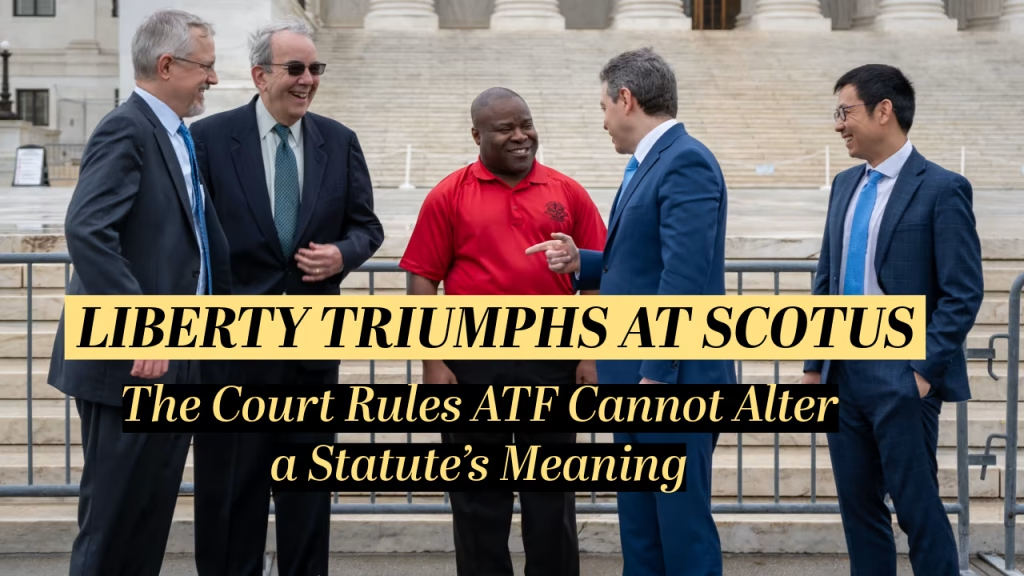
NCLA is delighted that the Court has vindicated the principle that ATF does not have the power to rewrite criminal laws.
In NCLA’s Bump-Stock Ban Case, U.S. Supreme Court Rules ATF Cannot Alter a Statute’s Meaning
The U.S. Supreme Court ruled 6-3 in NCLA’s case of Garland v. Cargill that the Bureau of Alcohol, Tobacco, Firearms and Explosives’ (ATF) unilateral bump-stock ban conflicts with the federal statute defining “machineguns.” ATF’s regulatory ban, which the U.S. Court of Appeals for the Fifth Circuit shot down early last year, reversed the agency’s own long-standing recognition that bump-stock-equipped firearms are not machine guns. NCLA commends the High Court for permanently setting ATF’s ban aside, safeguarding the rights of our client Michael Cargill and hundreds of thousands of other Americans to be free from laws written by executive branch bureaucrats instead of elected Members of Congress. We celebrate this historic victory with Jonathan Mitchell, who presented oral argument to the Supreme Court on NCLA’s behalf. Read more >>>
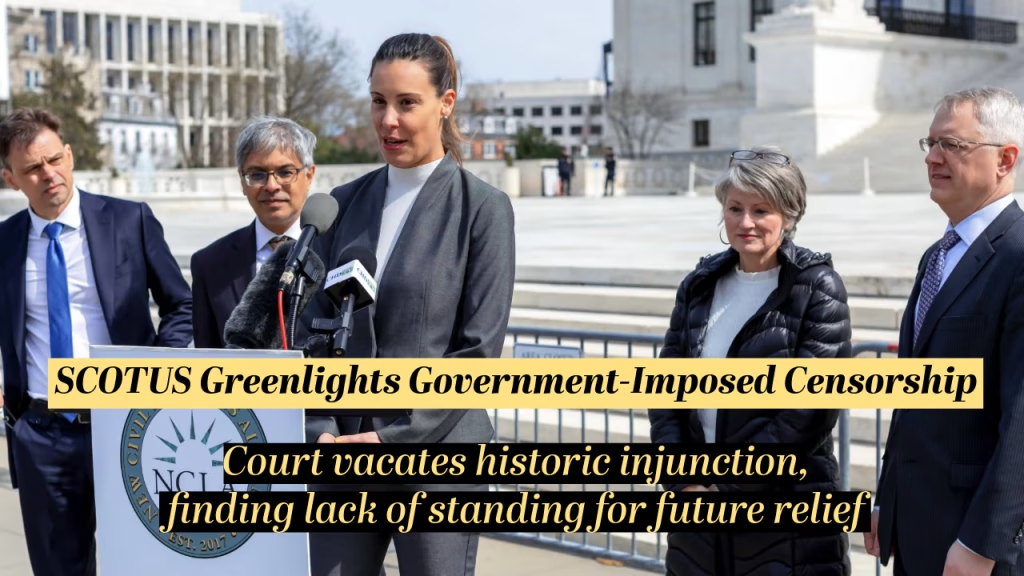
The “censorship industrial complex” has successfully suppressed truthful perspectives contradicting other government-approved narratives.
Supreme Court Issues Troubling Decision in NCLA Case Against Censorship Industrial Complex
The U.S. Supreme Court voted 6-3 to vacate a historic preliminary injunction granted by the U.S. Court of Appeals for the Fifth Circuit in the case of Murthy v. Missouri, finding that the Respondents protected by the injunction lacked standing to support injunctive (that is, future) relief. The injunction had barred officials from the White House, CDC, FBI, Cybersecurity and Infrastructure Security Agency (CISA), and the Surgeon General’s office from encouraging social media platforms to censor constitutionally protected speech. Representing Drs. Jayanta Bhattacharya, Martin Kulldorff, and Aaron Kheriaty, and Ms. Jill Hines, NCLA is disappointed by this dramatic shrinking of Americans’ First Amendment rights. The Court protected the government’s ability to censor truthful speech that opposed the government’s false and manipulative narratives on multiple aspects of the Covid-19 pandemic, including our clients’ true statements challenging government falsehoods about natural immunity, vaccine efficacy, masking, the origins of the Wuhan virus, and many other topics. This decision enabling the censorship industrial complex will have grave consequences for years to come. Missouri v. Murthy will now return to the lower courts for further proceedings. Read more >>>
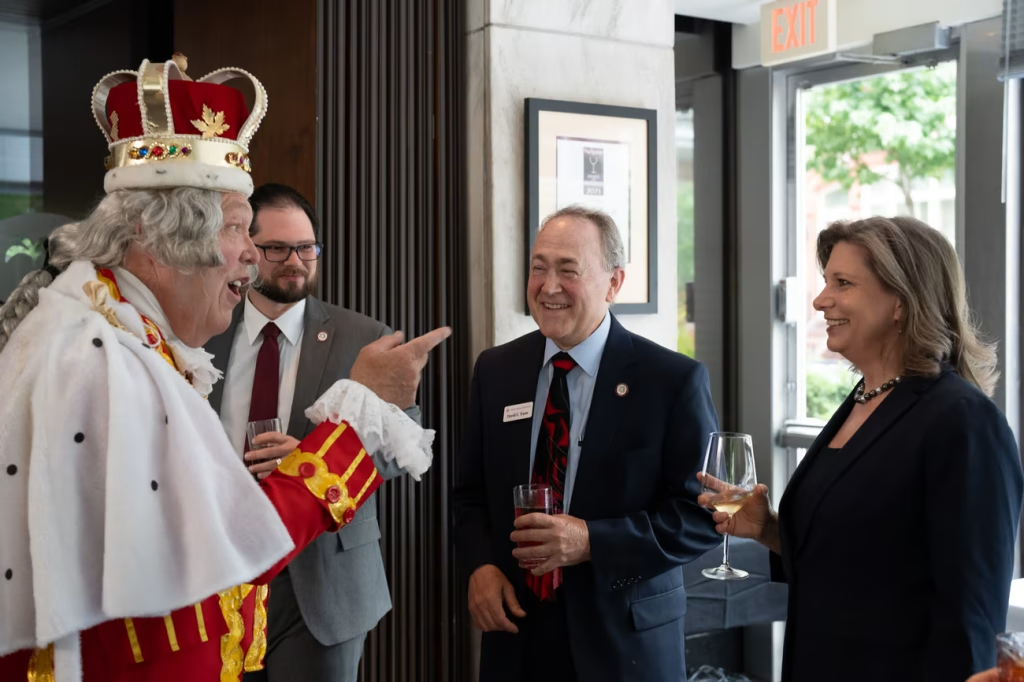
The King George III Prize is the people’s chance to vote for the worst abusers of civil liberties.
NCLA’s King George III Prize Recognizes Secretaries Cardona and Mayorkas as the Worst Civil Liberties Violators
The polls are closed and the Administrative State’s biggest civil liberties abusers are Secretary of Education Miguel Cardona and Homeland Security Secretary Alejandro Mayorkas! After a weeks-long public vote as part of NCLA’s Fourth Annual “King George III Prize,” Cardona and Mayorkas garnered the most votes among 32 rights-violating bureaucrats in bracket campaigns on social media. In the “Runaway Regulator” category, Cardona took the King George III Prize over EPA Administrator Michael Regan. In the “State Censorship” category, Mayorkas won the King George III Prize over Secretary of State Antony Blinken. The two “winners” were announced at an event in Washington, DC. Read more >>>
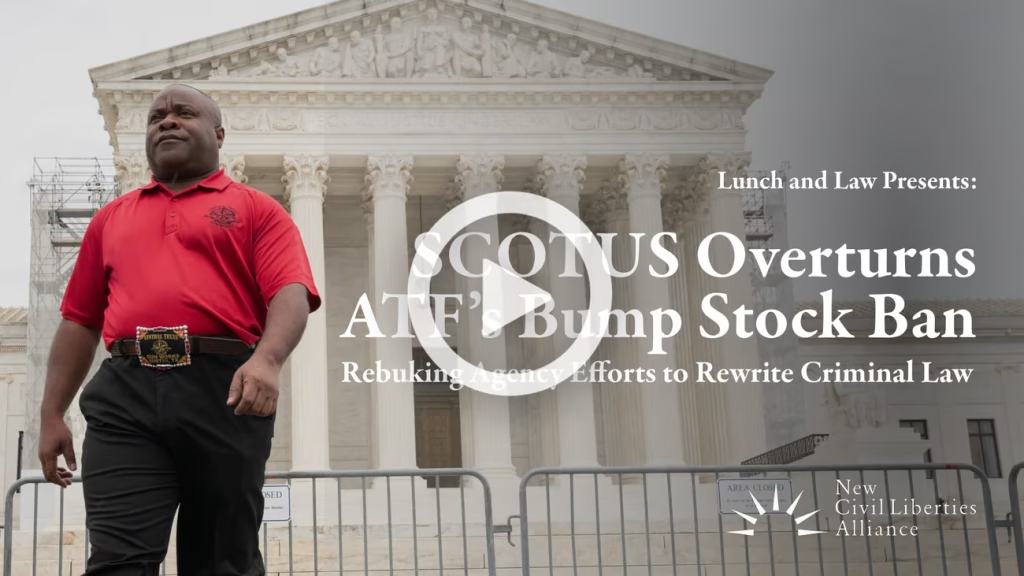
The ATF’s ban, overturned by the Fifth Circuit last year, contradicted its own recognition that bump-stock-equipped firearms aren’t classified as “machineguns.”
Lunch and Law: SCOTUS Overturns ATF’s Bump Stock Ban, Agency Cannot Rewrite Criminal Law
In our recent Lunch and Law series, we examined the important Supreme Court decision in the Cargill case, described by David Lat in Original Jurisdiction as one of the biggest cases of the term. This important ruling, which sided with the NCLA’s stance against the ATF’s bump-stock ban, reaffirms that agencies cannot regulate beyond their statutory authority. The decision highlights the need for systemic solutions to prevent agency overreach and underscores Congress as the sole author of criminal laws. We discussed the legal arguments that led to this victory and its implications for future rulings aimed at curbing the runaway Administrative State. Watch here >>>
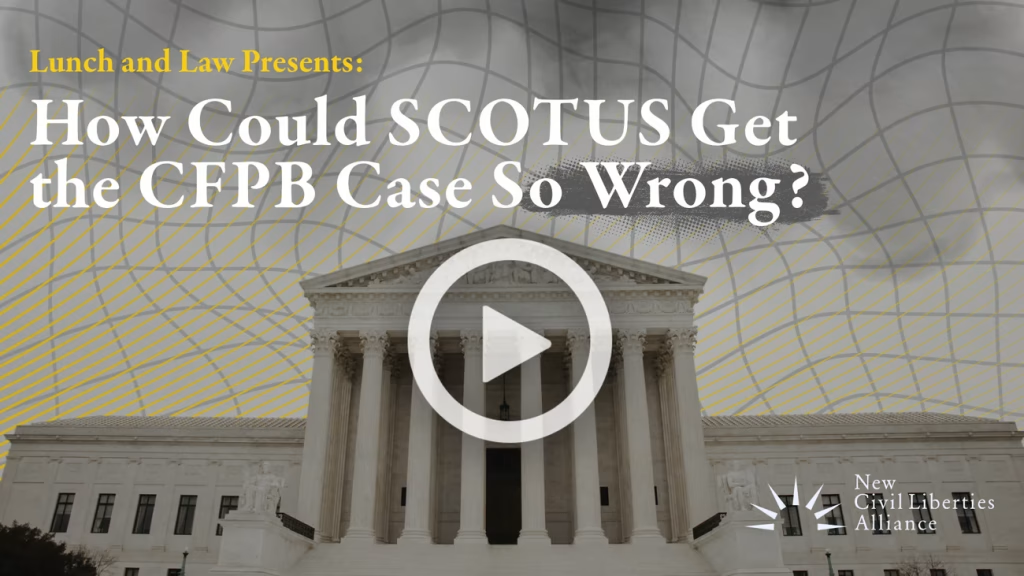
The CFPB directly draws funds from the Federal Reserve System, bypassing Congress’s usual appropriations oversight.
Lunch and Law: How Could SCOTUS Get the CFPB Case So Wrong?
The Consumer Financial Protection Bureau (CFPB) is funded uniquely and unconstitutionally. CFPB draws money directly from the earnings of the Federal Reserve System to carry out the bureau’s duties, completely sidestepping Congress’s normal appropriations control. And yet, in a 7-2 opinion written by Justice Thomas, the Supreme Court in CFPB v. CFSA recently upheld this highly unusual mechanism as constitutional.
In this Lunch and Law series, NCLA President Mark Chenoweth, along with panelists Adam J. White, Executive Director of the C. Boyden Gray Center for the Study of the Administrative State; Richard Samp, seasoned constitutional appellate litigator and member of the NCLA Board of Advisors; and Louis Capozzi, former law clerk to Justice Neil Gorsuch, appellate litigator at Jones Day, and lecturer at UPenn’s Carey School of Law, discuss the implications of the Court’s decision. Watch here >>>
Cases to Watch

The FLSA exempts anyone “employed in a [white collar] capacity” from its minimum wage and overtime requirements, a definition based on their job’s function, not their pay.
NCLA Suit Fights DOL’s Unlawful Undermining of Longstanding Wage and Overtime Exemption
NCLA has filed a Complaint challenging an unconstitutional new rule from the Department of Labor (DOL) that sets a salary standard for determining whether “white collar” employees are exempt from Fair Labor Standards Act (FLSA) minimum wage and overtime requirements. The new regulation prevents employers, including countless small businesses, from claiming the exemption for 7.7 million employees nationwide. Shrinking this exemption would require employers to reclassify these employees as hourly, thus preventing them from benefiting from flexible work arrangements. Representing the small software company Flint Avenue, LLC, NCLA asks the U.S. District Court for the Northern District of Texas to stop DOL’s new rule. Flint Avenue competes with large corporations by offering its seven employees flexible work arrangements, including unlimited vacation. The new rule would force it to reclassify five of those employees as hourly, making such mutually beneficial arrangements no longer possible. Read more >>>

SEC lacks legal authority to issue these rules, which are an attempt to make climate policy by way of mandated financial disclosures.
NCLA Asks Eighth Circuit to Vacate SEC’s Unconstitutional New Climate Disclosure Rules
NCLA has filed a joint opening brief in National Center for Public Policy Research v. SEC, urging the U.S. Eighth Circuit Court of Appeals to set aside new SEC rules requiring public companies to make extensive climate-related disclosures. NCLA’s challenge to the SEC rules is consolidated with U.S. Chamber of Commerce, et al. v. SEC, in which Gibson Dunn & Crutcher LLP represents the petitioners. Representing the National Center for Public Policy Research in a brief alongside the U.S. Chamber of Commerce, Texas Association of Business, and Longview Chamber of Commerce, NCLA demands an end to SEC’s unconstitutional pursuit of climate activism at the cost of civil liberties. Read more >>>
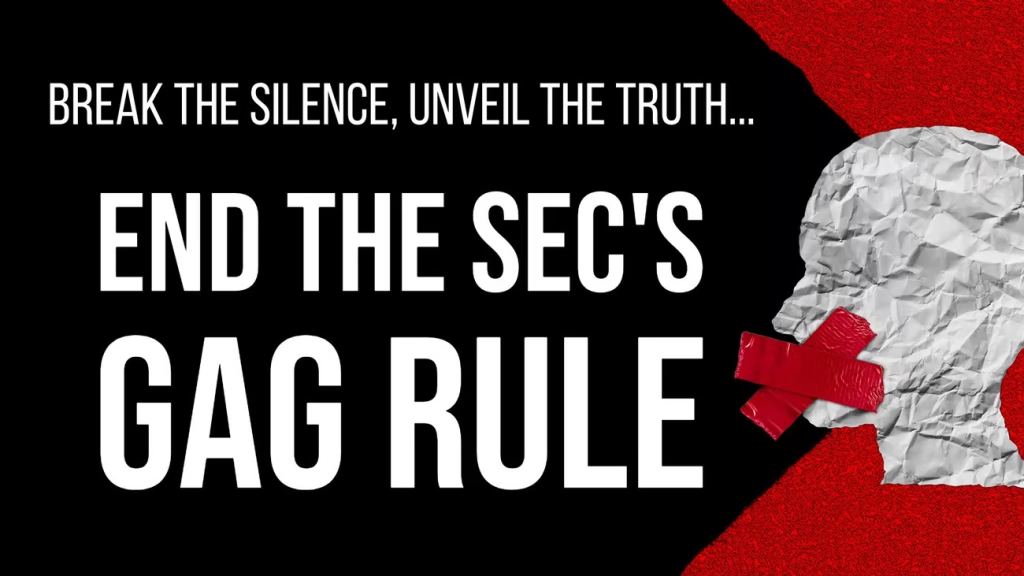
The agency never had statutory authority to implement the Gag Rule and it bypasses the Administrative Procedure Act.
NCLA Asks Ninth Circuit to End SEC’s Illegal Gag Rule Against Targets of Settled Enforcement Cases
NCLA has filed an opening brief in Powell, et al. v. SEC, asking the U.S. Court of Appeals for the Ninth Circuit to vacate SEC’s refusal to amend its “Gag Rule.” NCLA represents SEC enforcement targets silenced by the Gag Rule and media organizations eager to hear their stories. In place for over five decades, this rule forbids every American who settles a regulatory enforcement case with SEC from even truthfully criticizing their cases in public for the rest of their lives. SEC ignored NCLA’s initial petition challenging the Gag Rule for more than five years, only issuing a denial after NCLA filed a renewed petition in December. NCLA is challenging that denial to halt SEC’s trampling of First Amendment rights. Read more >>>
Click here for more cases to watch
Friends of the Court
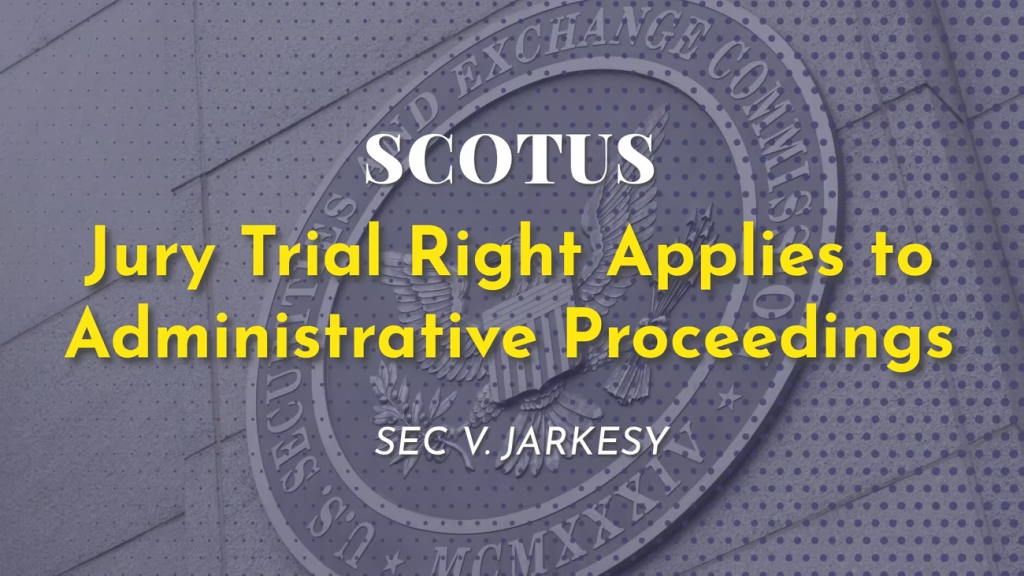
NCLA’s amicus brief also pointed out that SEC’s ALJs have enjoyed multiple layers of protection from removal by the President.
In NCLA Amicus Win, Supreme Court Restores Americans’ Rights to Trial by Jury
The U.S. Supreme Court struck a blow for freedom and restored the precious right to a trial by jury for Americans confronting the Administrative State. The Court affirmed the U.S. Court of Appeals for the Fifth Circuit’s decision in SEC v. Jarkesy, overturning the Securities and Exchange Commission’s unconstitutional administrative prosecution regime. SEC targeted investment professional and syndicated talk-radio host George R. Jarkesy, Jr. in a years-long administrative proceeding adjudicated by an Administrative Law Judge (ALJ) without a jury. Agreeing with the New Civil Liberties Alliance’s amicus curiae brief in the case, the Supreme Court ruled 6-3 that SEC violated Mr. Jarkesy’s Seventh Amendment right to a jury trial. NCLA celebrates this historic victory over SEC’s abuse of power, vindicating Americans’ civil liberties. Read more >>>
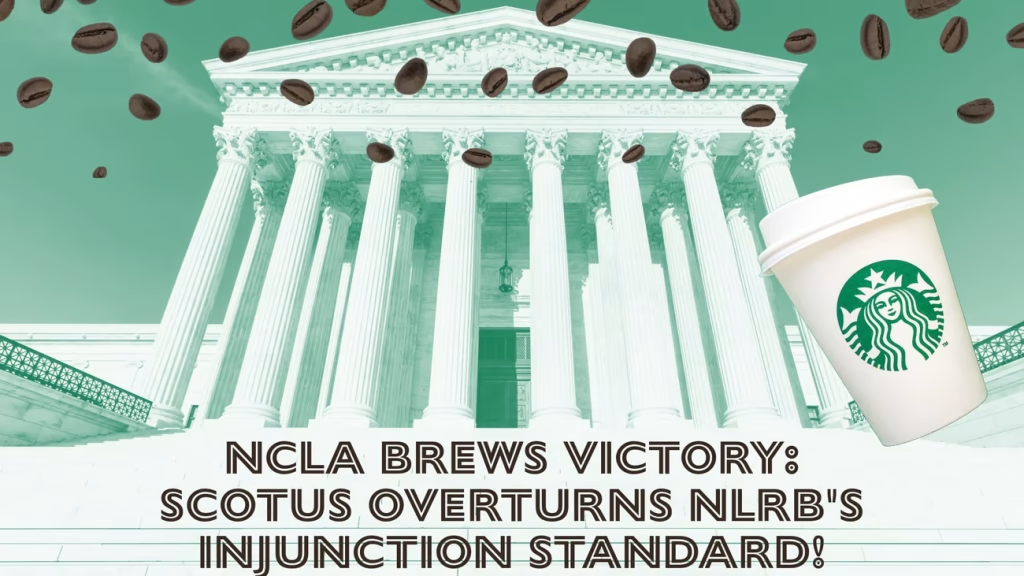
This decision overturns lenient standards in five federal circuits, where the NLRB could penalize employers based on meritless claims for preliminary injunctions.
In NCLA Amicus Win, Supreme Court Overturns NLRB-Specific Preliminary Injunction Standard
The U.S. Supreme Court issued an 8-1 decision in Starbucks Corp. v. McKinney, overturning a deferential legal standard that has allowed the NLRB to enjoin a company’s conduct without showing that it likely broke the law. Justice Thomas authored the Court’s opinion. Justice Jackson provided a ninth vote, concurring in the judgment, but dissenting in part at a length greater than the majority decision. The Court held that federal courts may not issue preliminary injunctions unless the NLRB meets four requirements: (1) it is likely to succeed on the merits; (2) it would suffer irreparable injury absent an injunction; (3) the balance of equities favors an injunction; and (4) an injunction serves the public interest. These are the same four preliminary injunction factors that every other litigant has always had to satisfy. Read more >>>
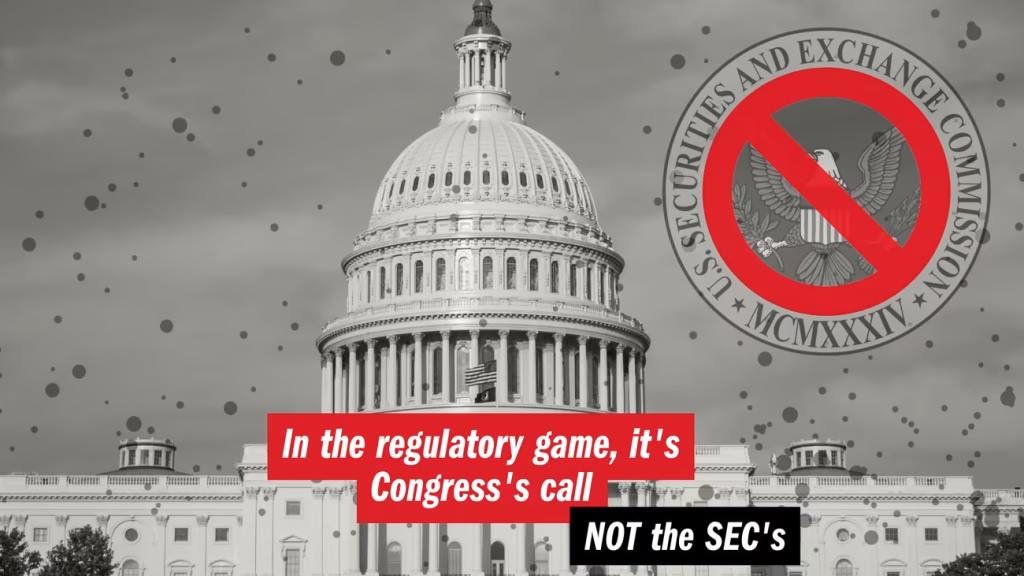
NCLA applauds the Fifth Circuit’s decision vacating—in its entirety—SEC’s latest attempt to burden private industry through lawless administrative fiat.
In NCLA Amicus Win, Fifth Circuit Topples SEC’s Unlawful Effort to Regulate Private Funds
The U.S. Court of Appeals for the Fifth Circuit issued a decision in National Association of Private Fund Managers v. Securities and Exchange Commission vacating SEC’s recent final rule restricting—and in some cases prohibiting—certain common contractual agreements between private investment funds and investment advisers. Following NCLA’s amicus curiae brief’s advice, the Court declared that SEC exceeded its statutory authority in promulgating the unlawful rule because Congress never gave SEC oversight of this aspect of private funds. NCLA thanks securities law scholars Paul Mahoney, Adam Pritchard, and J.W. Verret for joining in NCLA’s brief as amicus partners. Read more >>>

The Tenth Circuit concluded that it lacked sufficient information to decide whether businesses like Covey Find Kennel are closely regulated and thus exempt from the search warrant requirement.
In NCLA Amicus Win, Tenth Circuit Clears Path to Toppling Intrusive Dog Kennel Inspection Regime
The U.S. Court of Appeals for the Tenth Circuit has reversed a district court decision in Johnson v. Smith that upheld a Kansas state law authorizing intrusive warrantless searches for dog training and handling businesses. NCLA filed an amicus curiae brief explaining that the warrantless-search law infringes the Appellants’ Fourth Amendment rights “to be secure in their persons, houses, papers, and effects, against unreasonable searches and seizures.” While the Tenth Circuit affirmed the district court’s dismissal of the Appellants’ claim that the state law violates their right to travel, it remanded the case to the lower court to determine whether the Fourth Amendment authorizes warrantless searches of dog training and handling businesses—the issue we briefed. NCLA expects the district court to now overturn the law. Read more >>>
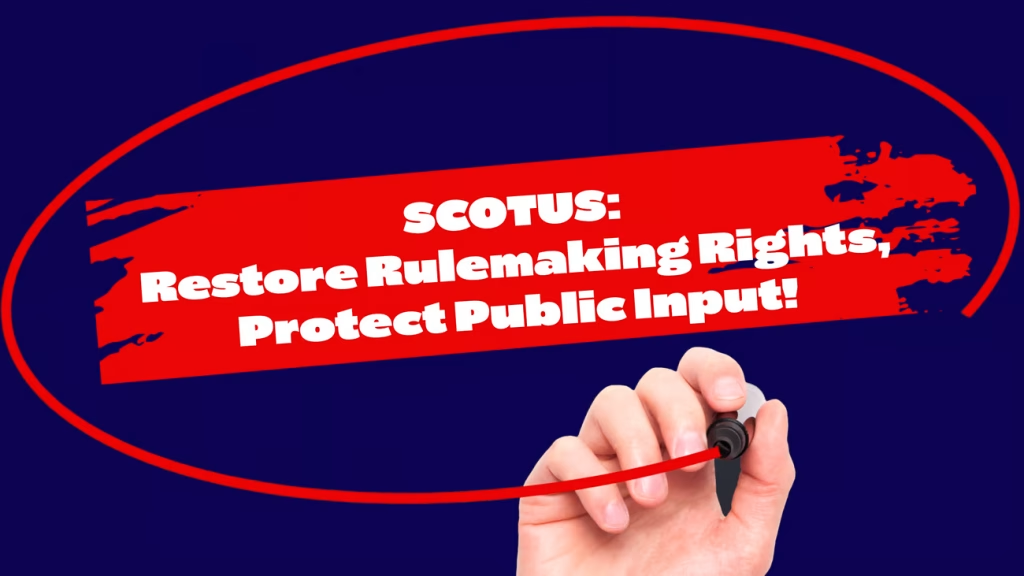
The Federal Circuit’s refusal to require notice-and-comment rulemaking for the PTO was a serious mistake. Once again, the U.S. Supreme Court must rectify the Federal Circuit’s error.
NCLA Asks Supreme Court to Force U.S. Patent Office Back to Using Notice-and-Comment Rulemaking
NCLA has filed an amicus curiae brief urging the Supreme Court to hear Chestek PLLC v. Vidal and stop the U.S. Patent and Trademark Office from eschewing notice-and-comment rulemaking. PTO should not be issuing rules that profoundly affect the economy without public input or considering all relevant information. The U.S. Court of Appeals for the Federal Circuit issued a mistaken decision below effectively erasing a statute that requires PTO to follow a notice-and-comment process before promulgating its rules. NCLA is asking the Supreme Court to reverse the Federal Circuit’s error and restore PTO’s Congressionally required accountability to the public. Read more >>>
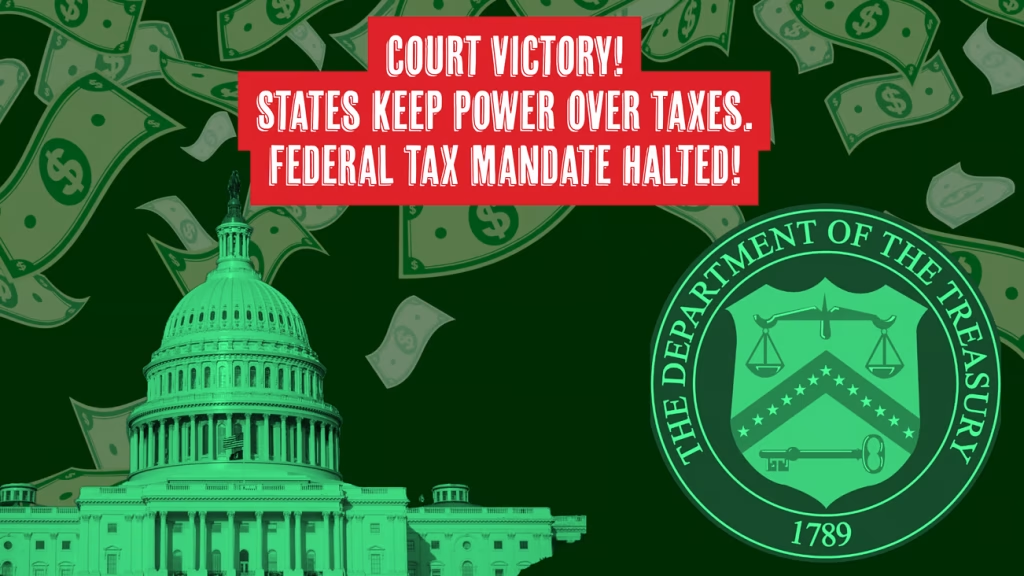
The Fifth Circuit joins other circuit courts in recognizing that Congressional conditions on spending must observe legal and constitutional constraints essential to federalism—and must do so with clarity.
In NCLA Amicus Win, Fifth Circuit Upholds Permanent Block on Treasury’s Illegal State Tax Cut Ban
The U.S. Court of Appeals for the Fifth Circuit affirmed a permanent injunction in States of Texas, Mississippi, Louisiana v. Yellen, shutting down the American Rescue Plan Act’s (ARPA) Tax Cut Ban condition that required the States to surrender their ability to decrease state taxes on their citizens in exchange for receiving federal rescue funds. NCLA filed amicus curiae briefs supporting the injunction, identifying the Tax Cut Ban as an attempt by Congress and the Treasury Department to usurp state legislative powers and prerogatives. The Ban violated bedrock provisions of the U.S. Constitution that define and constrain federal lawmaking. The Fifth Circuit ruled that Congress failed to meet its constitutional duty to make clear rules when it passed the Tax Cut Ban, finding the statute too ambiguous. The ruling marks NCLA’s third amicus win on appeal over this issue—following Commonwealth of Kentucky and State of Tennessee v. Janet Yellen and West Virginia v. U.S. Department of the Treasury, in the Sixth and Eleventh Circuits. Read more >>>
Click here for more amicus briefs to watch.
In the News
🎥 Supreme Court Weakens Power of Fed Regulators, Fox News
🎥 Supreme Court strikes down ban on bump stocks, KDFW
🎥 Supreme Court Upholds Domestic Violence Gun Ban, EWTN
📰 Supreme Court strikes down federal ban on bump stocks, Fox News
📰 Supreme Court strikes down Trump-era ban on bump stocks for firearms, CBS News
📰 Supreme Court strikes down Trump-era ban on rapid-fire rifle bump stocks, reopening political fight, AP
📰 US Supreme Court rejects federal ban on gun ’bump stocks’, Reuters
📰 Supreme Court strikes down Trump-era ban on bump stocks on guns, CNN
📰 Supreme Court Rejects Trump-Era Ban on Gun Bump Stocks, New York Times
📰 Supreme Court Strikes Down Trump-era Federal Ban on Bump Stock Devices, The Washington Post
📰 Law360’s Legal Lions Of The Week, Law360
📰 SCOTUS Delivers Stinging Rebuke to Federal Bureaucrats, Townhall
🎧 Philip Hamburger & restrictions on a charity’s free speech, Center for Civil Society
🎧 The World and Everything in It: June 17, 2024, The World and Everything in It
🎧 NCLA’s Peggy Little on Lawsuit vs. SEC Settling Policy, The Ross Kaminsky Show
Click here for more media mentions.
Administrative Cartoon
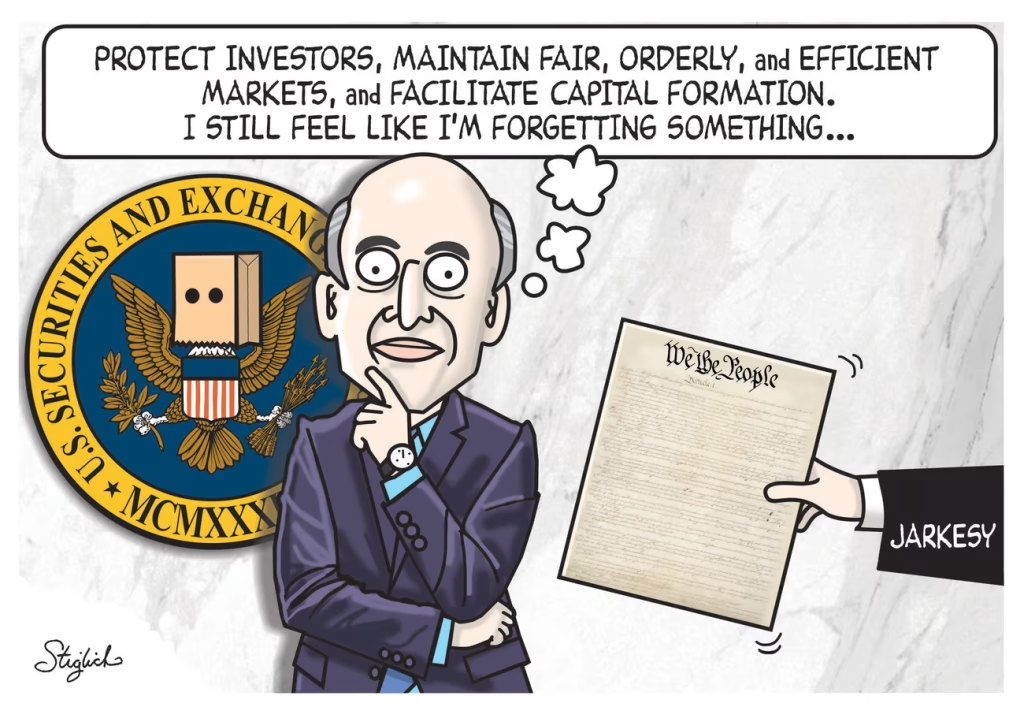
Permission granted to reprint with attribution

